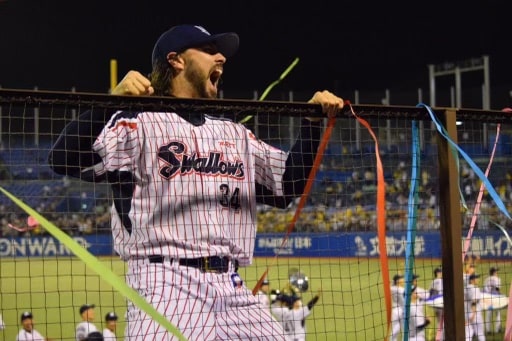
When Tony Barnette decided to continue his baseball career in Japan, he knew he was in for an experience. He just didn’t know what the experience would entail.
He began learning the moment he walked off the plane at Tokyo’s Narita international Airport on Jan. 26, 2010, and was greeted by a phalanx of media people and cameras – unexpected for the heretofore anonymous minor-league pitcher. With no translator at that moment, he faced questions fired at him in Japanese and broken English. A newspaper photo showed him wearing a Japanese headband – a hachimaki – while holding a rice ball in one hand and a baseball in the other. An accompanying graphic described the 6-foot-1 Caucasian with long black hair as a cross between actors Tom Cruise and Keanu Reeves. Next to the graphic was the word “ikemen”, which translates to “good-looking guy”.
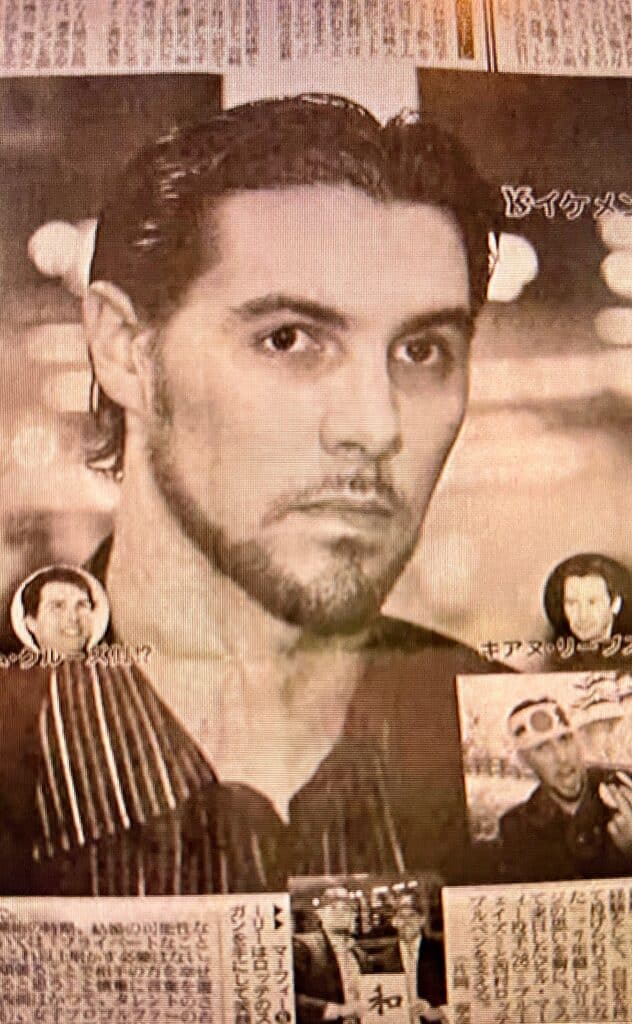

And that was just at the beginning of his six-year sojourn with the Yakult Swallows of Japan’s Nippon Professional Baseball, as told in detail by Aaron Fischman’s interesting and illuminating book “A Baseball Gaijin: Chasing a Dream to Japan and Back” that any baseball fan will enjoy. There would be much more to experience – some good, some bad; some frustrating, some rewarding.
While certainly not the first story about foreign players in Japan – think of author Robert Whiting’s excellent books, for example – Fischman’s book focuses primarily on one person, so he is able to into greater detail about the challenges and potential rewards of taking a leap of faith to live and play in a completely different environment.
Fischman goes deeply into Barnette’s sometimes-agonizing decision-making process. He hadn’t considered playing in Japan, but shortly after his fourth season in the Arizona Diamondbacks’ system, a teammate asked if he could give Barnette’s contact information to a Japanese agent. Essentially, Barnette said, “Sure, what the heck” and thought little more about it.
But then the agent, Don Nomura – who had facilitated Hideo Nomo’s move across the Pacific to MLB – got in touch. Barnette’s goal was to pitch in MLB, but with Arizona showing only mild interest, he consulted with a variety of people – his girlfriend and later wife, Hillary Jones; his father; Nomura; some who had played in Japan; and other expats – to weigh the pros and cons. Fischman interviewed all these people and discusses their experiences and input.
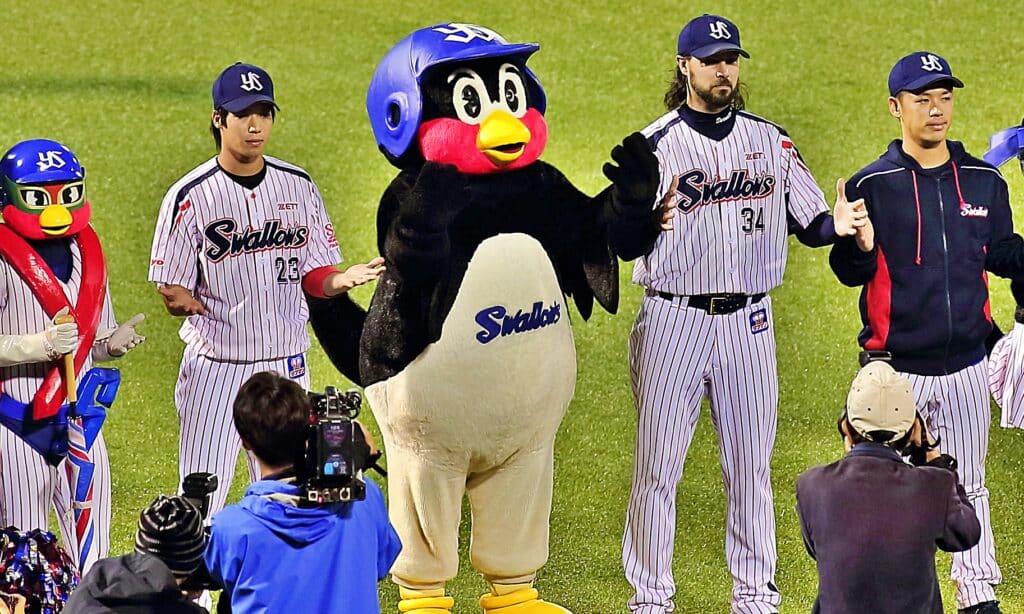
For Yakult, Barnette would have the chance to be a regular contributor, and the $500,000 salary was a fortune compared to the $2,100 a month he’d made in AAA. But, Fischman writes, Barnette wondered if he would be “trading [his] dreams for a paycheck. [Was he] potentially pursuing [his] dreams of being a professional baseball player even further? All these questions [were] flying around in [his] mind that just really couldn’t be answered.”
Nonetheless, he chose to go to Japan. And, for Barnette, who had never been out of North America, everything was different. The language, the food, the packed subways. The expectations, the Japanese-style training methods, the hyped-up fan experience. The smaller strike zone for foreign pitchers. And much more. The same experience all import players go through.
Fischman quotes Aaron Guiel, a three-year Swallows veteran by the time Barnette arrived, as saying, “I remember all of a sudden getting over there and feeling completely alone and realizing there is a massive body of water between you and your family, your car, your comfort zone . . . everything.”
Fortunately, Barnette developed a support system, and Fischman does a thorough job of showing how so many people helped. Those included his eventual wife, who joined him in Japan and gave birth to their first child there; interpreter Go Fujisawa; team managers and coaches such as Junji Ogawa, Mitsuru Manaka, and Tomohito Ito; an expat community that included sportswriter Rob Smaal from Canada and David Watkins from the U.K., who had created an English-language website for Swallows fans; and expat teammates such as Guiel and others.
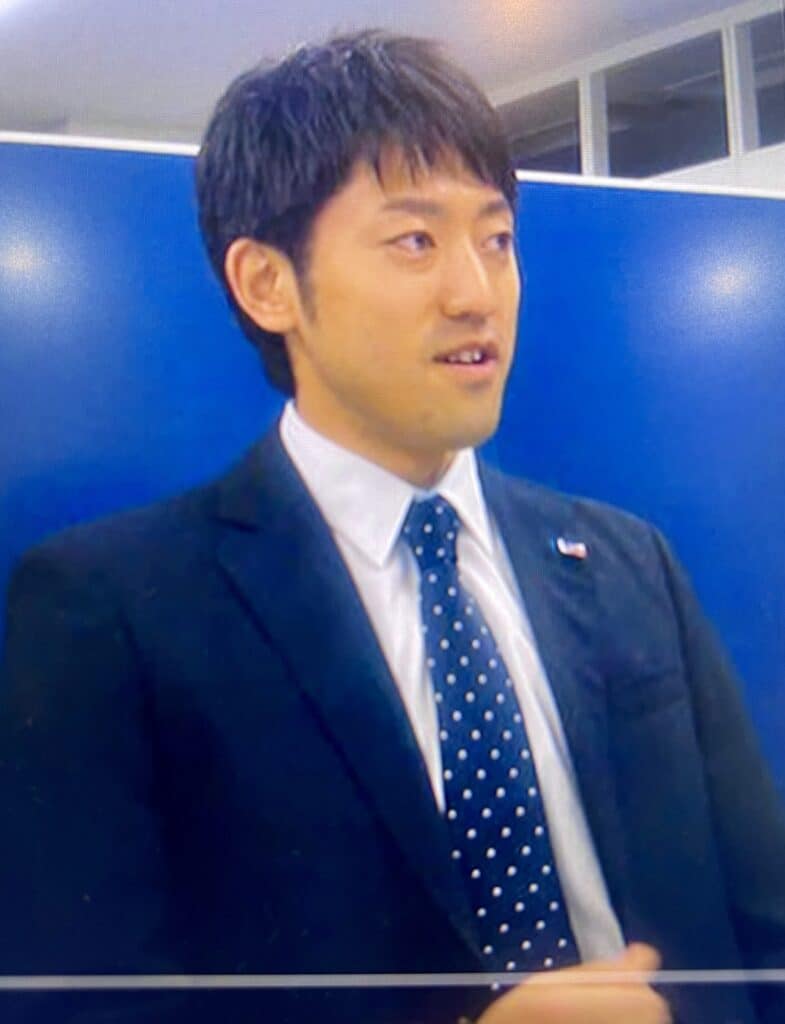
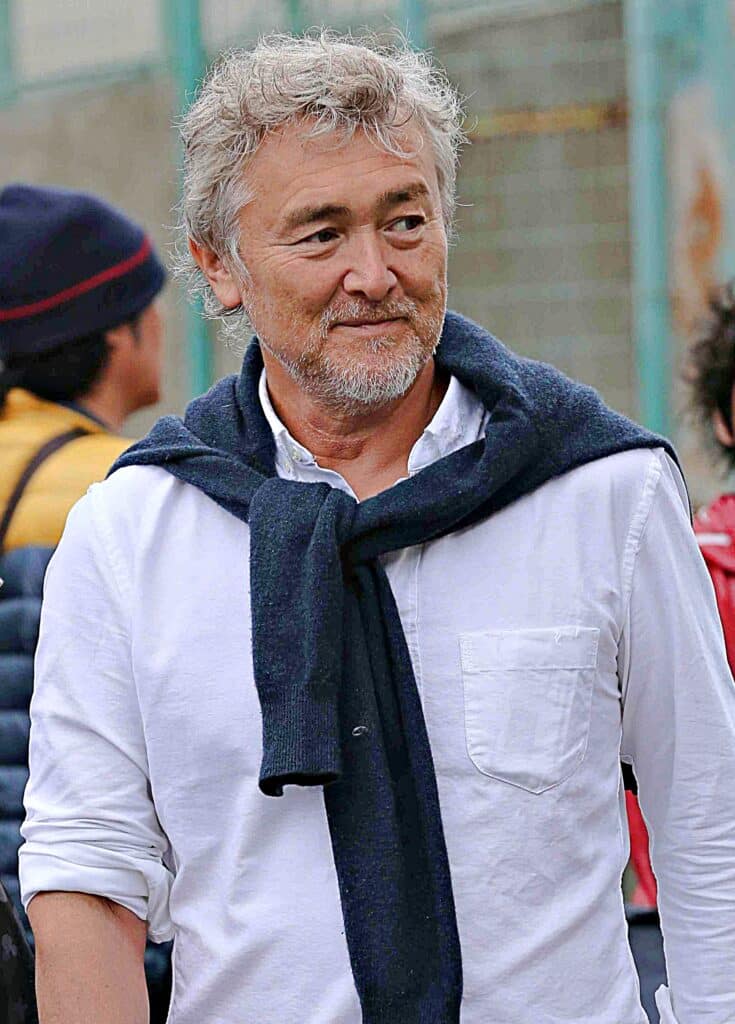
Fischman gives the book additional depth by detailing the stories of several of the expats and how they drew upon their experiences to advise Barnette.
It helped, too, that Barnette stayed with the same club for six seasons, unlike some foreign players who come for a year or two and go home – more like interlopers. Yakult fans often gave the family letters, drawings, and other gifts. One fan learned that Barnette liked Oreo cookies, so fans would often gift him those.
Barnette’s attitude was also important. In the book’s foreword, Nomura writes that “a gaijin will ultimately fail if he doesn’t come in humble, open-minded, and willing to work his butt off. I’ve had clients who would constantly complain about various restrictions or obligations . . . . [but] Tony was not that guy. Quite the opposite.”
For example, the book describes how Barnette adjusted to the Japanese spring training routine.
“Unlike the . . . major league camps, efficiency did not seem to be valued,” he said. “Instead, perception, seniority, and submitting to authority were placed at a premium.”
He had been used to the concept of “you get your work in, and then you go home,” but he discovered that this irritated his teammates, so he “learned to pace out [his] days . . . it’s not so much how much work and how much time; it’s how much work is perceived that you’ve done.”

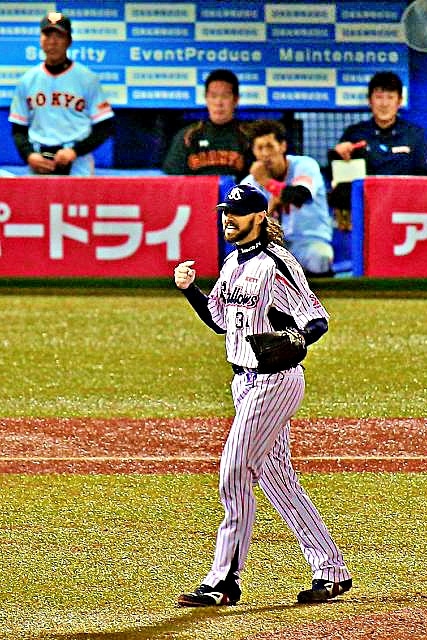
The author describes Barnette’s difficult first season that led to his release by the Swallows. Often, Barnette thought “Maybe I’m not where I’m supposed to be.”
But the Swallows changed their minds and offered him a contract for 2011, albeit at a 50-percent pay cut, which did not bother him at all.
In the book, his teammate Guiel said that Barnette’s professionalism during his first season may have been a factor: “When he was a starter and had some failures, I think he carried himself very well. I think those are the key reasons why that door stayed open, whereas [for] a lot of other foreigners, that door closes.”
Fortunately, Barnette had throughout his career developed what Nomura called “an unrelenting resilience” after often being overlooked during a career that began as a smallish high-school pitcher.
Early in his second season, he developed a cut fastball that became a powerful weapon, and he also transitioned to a relief role, despite his initial ambivalence. The move was career-altering, as he became a first-rate closer and helped the Swallows to the 2015 Central League championship. That earned him his longstanding goal of getting to the big leagues with the Texas Rangers. Barnette spent three seasons there and then a brief time with the Chicago Cubs in 2019. After that, he returned to Yakult in an international scouting role, in which he and Guiel work together.

Barnette views his “Japanese playing experience as a gift,” Fischman writes. The same organization that gave him the chance to further develop as a player then gave him the chance for another act in his baseball career. It is a very interesting and inspirational story that Fischman tells expertly and in a very readable style. The book would be a worthwhile addition to the library of any baseball fan.
Click here if you’re interested in purchasing the book.
To hear directly from Tony Barnette (and Aaron Guiel), check out this recap of a JapanBall Chatter-Up meeting from May 2021, in which he participated. Then, listen to this interview with JapanBall President Shane Barclay.
